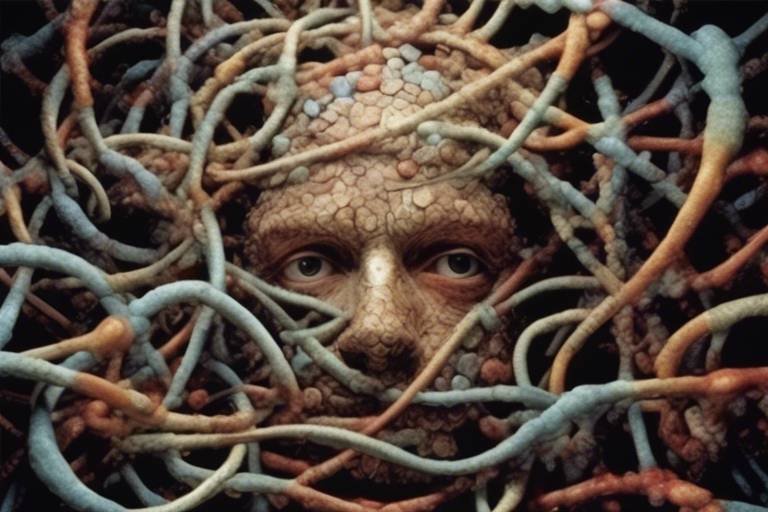Seeking the Meaning of Being in Ontology
Ontology, the philosophical study of being, is a fascinating field that invites us to ponder the very nature of existence. What does it mean to "be"? Is existence merely a state of being, or is it something more profound? These questions have intrigued thinkers for centuries, leading to a rich tapestry of ideas that challenge our understanding of reality. In this exploration, we will dive deep into the fundamental concepts of ontology, examining how various interpretations shape our grasp of existence and reality.
At its core, ontology seeks to unravel the complexities of existence. Imagine standing before a vast ocean, where each wave represents a different aspect of being. Some waves may symbolize tangible objects, such as trees or buildings, while others might represent abstract concepts like love or justice. Each wave ebbs and flows, reflecting the dynamic nature of reality. This article aims to surf those waves, exploring the philosophical inquiries that have shaped our understanding of what it means to exist.
In our journey through ontology, we will encounter historical perspectives that have laid the groundwork for contemporary thought. From Aristotle's foundational ideas about substance and essence to Heidegger's existential inquiries, each philosopher has contributed unique insights that continue to resonate today. As we navigate through these historical frameworks, we will also engage with modern ontological debates, particularly the tension between realism and anti-realism, and the concept of ontological commitment.
Ultimately, seeking the meaning of being in ontology is not just an academic exercise; it is a quest that touches the very essence of our lives. It invites us to reflect on our own existence, our place in the universe, and the connections we share with others. So, let’s embark on this philosophical adventure together, unraveling the mysteries of being and discovering how they influence our understanding of reality.
Understanding the essence of being is crucial in ontology, as it forms the foundation for exploring existence. This section delves into various interpretations of what it means to 'be.' The nature of being can be likened to a multifaceted gem, each facet revealing a different perspective. Some philosophers argue that being is tied to physical existence, while others suggest that it encompasses a broader range of experiences, including mental and emotional states.
For instance, consider the following interpretations of being:
- Physical Existence: This view posits that being is synonymous with the physical world. If something exists, it must occupy space and time.
- Mental States: Others argue that our thoughts, feelings, and consciousness are equally valid forms of being. After all, can we truly say something exists if it is not perceived?
- Relational Existence: This interpretation emphasizes the relationships between entities. Being is not just about individual existence but also about how we connect with others.
These interpretations highlight the complexity of being and the various dimensions that ontology seeks to explore. As we continue our examination, we will uncover how historical perspectives have shaped these ideas, leading us to a richer understanding of existence.
Ontology has evolved through history, influenced by key philosophers. This section reviews significant contributions from figures like Aristotle, Descartes, and Heidegger, highlighting their impact on contemporary thought. Each of these philosophers has left a lasting legacy, shaping the way we think about existence and reality.
Aristotle's views on substance and essence laid the groundwork for Western ontology. He believed that understanding the nature of being required a thorough examination of substances—entities that exist independently. According to Aristotle, substances have essential properties that define them, and understanding these properties is crucial for grasping the essence of being.
Aristotle distinguished between substances and accidents, which is crucial for understanding identity and change. A substance is what something is, while accidents are the properties that can change without altering the substance itself. For example, consider a tree:
- Substance: The tree itself, its essence.
- Accidents: The color of its leaves, its height, or the number of branches.
This distinction has profound implications for ontology, as it raises questions about what constitutes identity and how entities can change over time without losing their essence.
Aristotle categorized beings into different types, each with unique properties. These categories include substances, qualities, quantities, and relations. Understanding these categories is essential for contemporary ontological discussions, as they provide a framework for analyzing the complexities of existence.
Heidegger redefined ontology by focusing on existence itself. His concept of 'Dasein'—a term that translates to "being there"—emphasizes the importance of human experience in understanding being. Heidegger argued that to grasp the essence of existence, we must consider our lived experiences, our interactions with the world, and our relationships with others.
Contemporary philosophy has sparked new debates in ontology, particularly regarding realism and anti-realism. These discussions are crucial for understanding how we perceive reality and the implications of our beliefs about existence.
The tension between realism and anti-realism shapes modern ontological discourse. Realism posits that entities exist independently of our perceptions, while anti-realism suggests that our understanding of reality is shaped by our experiences and interpretations. This debate raises essential questions about the nature of existence and the role of human perception in shaping our understanding of reality.
The concept of ontological commitment involves the entities one must accept to make sense of a theory. Understanding what we are committed to ontologically helps clarify our philosophical positions and the implications of our beliefs. In both philosophy and scientific discourse, ontological commitments play a vital role in shaping our understanding of reality and existence.
- What is ontology? Ontology is the philosophical study of being, focusing on the nature of existence and reality.
- Who are the key philosophers in ontology? Notable figures include Aristotle, Descartes, and Heidegger, each contributing unique insights into the nature of being.
- What is the difference between realism and anti-realism? Realism posits that entities exist independently of our perceptions, while anti-realism suggests our understanding of reality is shaped by our experiences.

The Nature of Being
Understanding the essence of being is crucial in ontology, as it forms the foundation for exploring existence. When we ponder what it means to 'be,' we dive into a realm filled with philosophical inquiries that challenge our perceptions and beliefs. So, what does it truly mean to exist? Is being merely about physical presence, or does it encompass something deeper, like consciousness or identity? These questions can feel like a never-ending rabbit hole, but they are essential for grasping the complexities of existence.
To get a clearer picture, let's consider the various interpretations of being. On one hand, some philosophers argue that being is a fundamental property of reality, a characteristic that every entity possesses. On the other hand, there are those who believe that being is not static but rather a dynamic process, constantly shaped by our experiences and interactions. This duality in understanding can be likened to the way we perceive a river: while it may seem like a singular entity, it is always changing, flowing, and adapting.
Moreover, the nature of being can be viewed through different lenses, such as existentialism, which emphasizes individual experience and the subjective nature of existence. Think about it: each person’s understanding of being is colored by their unique experiences, emotions, and choices. This subjective approach challenges the notion of a universal definition of being, suggesting instead that our perceptions are as varied as the stars in the sky.
In addition, consider the implications of language on our understanding of being. Language shapes our thoughts and can limit or expand our perceptions. For instance, the words we use to describe our existence can either confine us to a narrow understanding or open the door to broader interpretations. This highlights the importance of philosophical inquiry in shaping our concepts of reality and existence.
Ultimately, the nature of being is a multifaceted concept that invites us to explore the depths of existence. It challenges us to question our assumptions and encourages a journey of discovery that is as enriching as it is perplexing. As we continue to delve into these philosophical waters, we may find that the answers we seek are not just about defining being, but about understanding our place in the vast tapestry of reality.
- What is ontology? Ontology is a branch of philosophy that studies the nature of being, existence, and reality.
- Why is understanding being important? Understanding being helps us explore fundamental questions about existence and our place in the universe.
- How do different philosophers view being? Different philosophers, such as Aristotle and Heidegger, have unique interpretations of being, which influence contemporary thought.

Historical Perspectives
Ontology, the study of being and existence, has a rich and complex history shaped by various philosophers across centuries. Each thinker has contributed unique insights that have not only influenced their contemporaries but have also laid the groundwork for modern philosophical thought. To truly appreciate the evolution of ontology, we must look back at the significant contributions made by key figures such as Aristotle, Descartes, and Heidegger. Their ideas continue to resonate today, providing a framework for understanding the intricate nature of existence.
Starting with Aristotle, often regarded as the father of Western philosophy, his ontological framework was groundbreaking. He introduced the concept of substance and essence, which became a cornerstone for subsequent philosophical inquiry. Aristotle’s classification of beings into categories was revolutionary; he emphasized that understanding what it means to 'be' requires analyzing the fundamental nature of substances—those entities that exist independently of anything else. His work set the stage for ontological discussions that would follow, influencing countless philosophers who came after him.
Next, we encounter René Descartes, whose contributions shifted the focus of ontology towards the relationship between existence and consciousness. Descartes famously declared, "I think, therefore I am," which underscored the importance of thought as a basis for existence. His dualistic approach, distinguishing between mind and body, sparked debates that are still relevant in contemporary discussions about the nature of being. Descartes' insistence on doubt and skepticism as tools for understanding reality opened new avenues for ontological exploration.
Moving into the 20th century, Martin Heidegger redefined ontology with his existential approach. He shifted the discourse from abstract concepts of being to the lived experience of existence itself. His exploration of 'Dasein,' or being-there, emphasizes the importance of human experience and the context in which it occurs. Heidegger argued that understanding being requires an examination of our existence within the world, highlighting the interconnectedness of being and time. This perspective has had profound implications for existential philosophy and continues to influence contemporary thought.
These historical perspectives not only showcase the evolution of ontological thought but also illustrate the ongoing relevance of these discussions in modern philosophy. Each philosopher brought forth ideas that challenged and enriched our understanding of existence, creating a tapestry of thought that continues to inspire inquiry. As we delve deeper into the implications of their work, it's essential to recognize how these foundational ideas have shaped our contemporary understanding of ontology.
In summary, the journey through historical perspectives on ontology reveals a rich landscape of ideas and debates. From Aristotle's foundational concepts to Heidegger's existential inquiries, the evolution of thought surrounding being has been dynamic and transformative. As we explore these philosophical contributions, we can better appreciate the complexities of existence and the ongoing quest for understanding what it truly means to 'be.'
- What is ontology? Ontology is the philosophical study of being, existence, and the nature of reality.
- Who is considered the father of ontology? Aristotle is often referred to as the father of ontology due to his foundational work in the field.
- How did Descartes influence ontology? Descartes shifted the focus of ontology towards the relationship between existence and consciousness, emphasizing doubt and skepticism.
- What is Heidegger's concept of Dasein? Dasein refers to the experience of being-there, highlighting the importance of human existence and context.

Aristotle's Ontological Framework
Aristotle, one of the most influential philosophers in Western thought, laid the groundwork for ontology with his profound inquiries into the nature of being. His approach to ontology was not merely abstract; it was deeply rooted in the empirical world, emphasizing the importance of observation and categorization. Aristotle's ontological framework revolves around the concepts of substance and essence, which he believed were fundamental to understanding existence. In his view, everything that exists can be categorized into substances, which are individual entities, and accidents, which are properties that can change without altering the essence of the substance itself.
To grasp Aristotle's perspective, it’s essential to understand his classification of beings. He proposed that substances are the primary reality; they are what things are fundamentally. For instance, when we think of a tree, we recognize it as a substance—a unique entity that exists independently. On the other hand, the color of the leaves or the height of the tree are considered accidents; they describe the tree but do not define its existence. This distinction is crucial because it helps us navigate through the complexities of identity and change. Imagine a chameleon changing its color; while its appearance may shift, its essence as a chameleon remains intact.
Aristotle categorized beings into different types, each possessing unique properties. He identified several categories, such as:
- Substances: Independent entities like animals, plants, and inanimate objects.
- Qualities: Attributes or characteristics that substances can have.
- Relations: How substances relate to one another.
- Places: The locations where substances exist.
- Times: The temporal aspects of existence.
Through this categorization, Aristotle sought to create a comprehensive framework that could explain the diversity of existence. His work not only influenced subsequent philosophers but also laid the foundation for many scientific disciplines. By establishing a clear distinction between what it means to be a substance versus an accident, Aristotle provided a lens through which we can analyze and understand the world around us.
In summary, Aristotle's ontological framework is a pivotal aspect of his philosophy, emphasizing the importance of substance and essence in understanding being. His insights continue to resonate in contemporary discussions of ontology, as they challenge us to consider how we define existence and the categories we use to describe the world. By engaging with Aristotle's ideas, we embark on a journey that not only explores the nature of reality but also our place within it.
- What is ontology? Ontology is the philosophical study of the nature of being, existence, and reality.
- Why is Aristotle important in ontology? Aristotle's work laid the foundational concepts of substance and essence, which are crucial for understanding being.
- How does Aristotle differentiate between substance and accident? Substance refers to the core identity of an entity, while accidents are properties that can change without altering that identity.

Substance vs. Accidents
When diving into the depths of ontology, one cannot overlook the pivotal distinction between substance and accidents. Aristotle, a cornerstone figure in this philosophical realm, introduced these concepts to help us understand the very fabric of existence. So, what exactly do we mean by these terms? In simple terms, a substance refers to the essence of a thing—what it fundamentally is—while accidents are the properties or qualities that a substance possesses, which can change without altering the substance itself.
To illustrate this, think of a classic example: a tree. The tree as a whole, its trunk, branches, and leaves, represent its substance. Now, consider the color of the leaves or the height of the tree; these characteristics are its accidents. If the leaves change color in autumn or if the tree gets pruned, the substance of the tree remains intact—it is still a tree. This distinction is crucial because it helps us grapple with questions of identity and change. How do we determine what remains constant in a world that is perpetually in flux?
Aristotle's exploration of this dichotomy leads us to ponder deeper implications. For instance, if we consider a person, their substance would be their identity or essence—what makes them who they are. In contrast, their accidents might include their age, hair color, or even their job. As these accidents change over time, the core essence of the person remains. This understanding allows us to navigate the complexities of existence and identity, providing a framework for discussing how things can change while still remaining fundamentally the same.
Moreover, this distinction has significant implications for modern philosophical debates. When discussing the nature of reality, recognizing the difference between substance and accidents can influence our understanding of what is truly 'real.' Are we to consider only the substances that exist independently, or do the accidents play a vital role in shaping our perception of reality? This conversation continues to evolve, drawing from Aristotle's foundational ideas while integrating contemporary perspectives.
In conclusion, the exploration of substance versus accidents not only enriches our understanding of ontology but also invites us to reflect on the nature of existence itself. It challenges us to consider how we define identity, how we perceive change, and ultimately, how we understand the world around us. As we continue to unravel these philosophical threads, we find ourselves at the intersection of ancient wisdom and modern inquiry, a place where the essence of being is continuously redefined.
- What is the main difference between substance and accidents? Substance refers to what something fundamentally is, while accidents are its changing properties.
- How does Aristotle's view influence modern philosophy? Aristotle's distinction helps frame discussions about identity, change, and the nature of reality.
- Can accidents ever define a substance? No, accidents can change without altering the fundamental essence of the substance.

Categories of Being
When we dive into the , we're essentially unpacking the various ways in which existence can manifest. Aristotle, the grandmaster of ontology, proposed a classification system that helps us navigate this complex landscape. His approach is not just a dry academic exercise; it’s a framework that can illuminate our everyday experiences and understanding of the world around us.
Aristotle identified several key categories that serve as the building blocks of being. These categories can be thought of as different lenses through which we can examine existence. Here’s a brief overview of some of the primary categories:
- Substance: This is the core of Aristotle's ontology. Substances are entities that exist independently, such as a tree or a person. They are the 'things' that have a distinct essence.
- Quality: This category refers to the characteristics that substances possess. For example, the color of a car or the height of a person falls under this category.
- Quantity: This relates to how much of a substance exists. It can refer to numbers or measurements, such as the number of apples in a basket.
- Relation: This category describes how substances are related to one another, like a parent to a child or a teacher to a student.
- Place: Where a substance is located also matters. The concept of being in a specific place adds another layer to our understanding of existence.
- Time: Time is a crucial aspect of being. It influences how we perceive change and continuity in existence.
Each of these categories plays a significant role in how we comprehend the essence of being. For instance, when we consider a tree, we recognize it as a substance that possesses qualities (like being green and tall), occupies a specific place (in a forest), and exists over time (growing and changing with the seasons). This multifaceted approach allows us to appreciate the richness and diversity of existence.
Moreover, these categories are not static; they interact and overlap in ways that reflect the complexity of reality. For example, the quality of a substance can change over time, or the relationship between two substances can alter their identities. This dynamic interplay is what makes ontology such a fascinating field of study.
In contemporary discussions, these categories continue to resonate. They invite us to question not just what exists, but how we relate to it. Are we merely observers of these categories, or do we actively shape them through our interactions? The exploration of these categories encourages a deeper engagement with our world, prompting us to recognize the interconnectedness of all beings.
Ultimately, understanding the categories of being is not just an academic endeavor; it’s a journey into the heart of what it means to exist. It challenges us to reflect on our own lives and the myriad ways in which we experience being, urging us to consider how we define ourselves and our place in the universe.
- What is the significance of Aristotle's categories of being? Aristotle's categories help us understand the different aspects of existence and how they relate to one another, providing a foundational framework for ontological inquiry.
- How do these categories apply to modern philosophy? The categories of being continue to influence contemporary discussions in philosophy, prompting debates about identity, change, and the nature of reality.
- Can these categories be applied to everyday life? Absolutely! Recognizing these categories can enhance our understanding of our experiences, relationships, and the world around us.

Heidegger's Existential Ontology
When we dive into the realm of , we're stepping into a world where the very essence of existence takes center stage. Unlike traditional ontology, which often gets bogged down in abstract categories and classifications, Heidegger shifts our focus to the lived experience of being. At the heart of his philosophy lies the concept of 'Dasein', a term he uses to describe human existence in its most authentic form. Dasein is not just about existing; it's about being aware of our existence, questioning it, and engaging with the world around us. This awareness brings forth a profound understanding of our place in the universe, making us not just passive observers but active participants in the unfolding of reality.
Heidegger argues that to truly grasp what it means to be, we must first confront our own existence. He famously stated, "Being is not something that can be easily defined or categorized." Instead, he invites us to explore our being-in-the-world, a state where we are inseparable from our surroundings and the relationships we forge. This perspective challenges us to consider how our experiences, emotions, and interactions shape our understanding of reality. In essence, Heidegger encourages us to embrace the uncertainty of existence, suggesting that the questions we ask about being are often more important than the answers we seek.
One of the key implications of Heidegger's existential ontology is the notion of authenticity. He posits that many people live inauthentic lives, conforming to societal norms and expectations without truly reflecting on their own existence. To live authentically, according to Heidegger, is to acknowledge our mortality and the finite nature of our lives. This awareness compels us to make choices that resonate with our true selves rather than simply going through the motions. In this way, existential ontology becomes a call to action, urging us to confront our fears, embrace our freedom, and ultimately, to create meaning in a world that often feels chaotic and indifferent.
Furthermore, Heidegger's exploration of time plays a crucial role in his understanding of being. He suggests that our existence is intrinsically linked to our perception of time. Unlike traditional views that see time as a linear progression, Heidegger proposes that we experience time in a more circular manner, where the past, present, and future are interconnected. This perspective allows us to see how our past experiences shape our current decisions and future possibilities. By recognizing this interconnectedness, we can better understand our own existence and the choices that define us.
In summary, Heidegger's existential ontology challenges us to rethink our understanding of being. It invites us to engage deeply with our existence, embrace our authenticity, and recognize the significance of our temporal experience. As we navigate the complexities of life, Heidegger's insights remind us that the journey of understanding being is not just an intellectual exercise but a deeply personal and transformative experience.
- What is Dasein? Dasein refers to the unique way humans exist in the world, characterized by self-awareness and the ability to question one’s own being.
- How does Heidegger's view of time differ from traditional perspectives? Heidegger sees time as interconnected rather than linear, emphasizing how our past influences our present and future.
- Why is authenticity important in Heidegger's philosophy? Authenticity is crucial because it encourages individuals to live true to themselves, rather than conforming to societal expectations.

Modern Ontological Debates
Modern ontological debates are like a vibrant tapestry woven from various threads of philosophical thought, each representing a different perspective on the nature of existence. In recent years, the discourse has intensified, particularly around the concepts of realism and anti-realism. These two opposing viewpoints have sparked heated discussions among philosophers, scientists, and even everyday thinkers. But what do these terms really mean, and why should we care about them?
At its core, realism posits that there is a reality independent of our perceptions or beliefs. In other words, things exist whether or not we acknowledge them. Think of it like a tree falling in a forest; according to realism, it makes a sound even if no one is around to hear it. This perspective is often associated with the idea that our theories and statements about the world can be objectively true or false, regardless of personal beliefs.
On the flip side, anti-realism challenges this notion, suggesting that our understanding of reality is fundamentally shaped by our perceptions and social constructs. If realism is the tree falling in the forest, anti-realism argues that the sound only matters if someone is there to hear it. This viewpoint emphasizes the role of human experience, language, and culture in shaping our understanding of existence. The implications of these debates extend beyond philosophy; they touch on science, ethics, and even politics.
In the realm of ontology, the tension between realism and anti-realism raises several important questions:
- Can we ever truly know the nature of reality?
- How do our perceptions shape our understanding of existence?
- What role does language play in defining what is real?
These questions are not just academic; they have real-world implications. For instance, consider the debates surrounding climate change. Realists argue that the physical changes in our environment are undeniable facts, while anti-realists may argue that our interpretations of these changes are influenced by political and social contexts. This interplay between objective reality and subjective interpretation highlights the significance of ontological debates in contemporary society.
Furthermore, the concept of ontological commitment emerges as a crucial element in these discussions. Ontological commitment refers to the entities that one must accept in order to make sense of a particular theory. For example, if a scientist posits a theory about the universe, they may be committed to the existence of certain entities, such as particles or forces, to validate their claims. This commitment can lead to philosophical dilemmas: what happens when different theories require different ontological commitments? Can we reconcile these differences, or are we left with a fragmented understanding of reality?
In conclusion, modern ontological debates are not merely intellectual exercises; they challenge us to reflect on our own beliefs and assumptions about existence. As we grapple with these complex issues, we must remain open to the possibility that our understanding of being is not only shaped by objective realities but also by our subjective experiences and cultural contexts. The journey through ontology is ongoing, and as we navigate these debates, we may find that the answers are not as clear-cut as we once thought.
- What is ontology? Ontology is the philosophical study of the nature of being, existence, and reality.
- What are realism and anti-realism? Realism asserts that reality exists independent of our perceptions, while anti-realism suggests that our understanding of reality is shaped by our experiences and social constructs.
- Why are ontological debates important? These debates influence various fields, including science, ethics, and politics, by challenging our understanding of what is real and how we perceive the world.

Realism vs. Anti-Realism
When diving into the world of ontology, one can't help but stumble upon the fascinating debate between realism and anti-realism. This philosophical tug-of-war is not just academic jargon; it resonates deeply with how we perceive reality and existence itself. So, what exactly do these terms mean? At its core, realism posits that the world exists independently of our thoughts or perceptions. In other words, there are entities out there, whether we acknowledge them or not. On the flip side, anti-realism suggests that reality is somehow dependent on our beliefs, perceptions, or linguistic frameworks. It raises the question: is the universe a stage where everything plays out regardless of our presence, or is it a canvas painted by our interpretations?
The implications of these positions extend far beyond mere theoretical discussions. For instance, consider how they influence scientific inquiry. Realists often argue that scientific theories aim to describe the world as it truly is, while anti-realists might contend that theories are merely useful tools for organizing our experiences. This leads us to ponder: when we conduct experiments or make predictions, are we uncovering the underlying truth of the universe, or simply creating models that help us navigate our experiences?
To further illustrate this debate, let’s break down some key arguments typically put forth by both sides:
- Realism: Advocates argue that our scientific theories can and do correspond to an objective reality. They believe that entities like electrons and black holes exist regardless of whether we observe them.
- Anti-Realism: Proponents assert that our understanding of such entities is mediated through our perceptions and linguistic constructs. They argue that without observation, one cannot claim the existence of anything.
This philosophical dichotomy also influences how we approach questions of existence. For realists, the existence of an object is a fact that can be verified through empirical evidence. Anti-realists, however, may argue that existence is contingent upon our conceptual frameworks, suggesting that what we deem "real" is shaped by our cultural and cognitive biases. This leads to rich discussions about the nature of truth and knowledge, ultimately asking us to reconsider the very foundations of what we believe to be true.
In contemporary discussions, this debate has evolved, with many philosophers attempting to find a middle ground. Some propose a nuanced view that recognizes the importance of both perspectives, suggesting that while certain entities may exist independently, our understanding of them is invariably colored by our experiences and interpretations. This synthesis opens up new avenues for inquiry, encouraging a more holistic approach to ontology.
In conclusion, the realism versus anti-realism debate is not just a theoretical exercise; it challenges us to reflect on our own beliefs about existence and reality. Whether we lean towards the idea of an independent world or acknowledge the role of our perceptions, this discussion is vital for anyone seeking to understand the deeper questions of being.
- What is realism in ontology? Realism posits that entities exist independently of our perceptions or beliefs.
- What is anti-realism? Anti-realism suggests that reality is dependent on our perceptions, beliefs, or linguistic frameworks.
- How does this debate affect scientific inquiry? It influences whether theories are seen as describing an objective reality or as useful tools for understanding our experiences.
- Can one be both a realist and an anti-realist? Some philosophers advocate for a middle ground, acknowledging the existence of entities while also recognizing the role of perception in shaping our understanding.

Ontological Commitment
When we dive into the concept of , we're essentially asking ourselves what kinds of things we must accept as real to make sense of our theories and beliefs. Think of it as the philosophical equivalent of packing your bags for a trip; you need to decide what to bring along based on where you're going. In the same way, ontological commitment helps us identify the essential entities that underpin our understanding of the world.
At its core, ontological commitment is about the existential assumptions we make when we propose a theory. For instance, if a scientist posits a theory about the behavior of particles, they must accept certain entities—like atoms and subatomic particles—as real for their theory to hold water. This acceptance is not just a casual agreement; it shapes the entire framework of their scientific inquiry. The implications are vast, affecting everything from scientific research to philosophical discussions.
Moreover, ontological commitment is not limited to the realm of science. It permeates various fields including philosophy, linguistics, and even everyday conversation. When we talk about concepts like love, justice, or even numbers, we are implicitly committing to a certain understanding of what these entities are. Are they merely abstract concepts, or do they have a tangible existence? This question leads us into the heart of ontological debates.
To clarify further, let’s explore some of the key aspects of ontological commitment:
- Entities and Theories: The entities we accept as real are directly linked to the theories we construct. For example, accepting that "social constructs" exist means we must also consider how they influence our understanding of reality.
- Philosophical Implications: The stance one takes on ontological commitment can shape philosophical discussions, especially in debates surrounding realism and anti-realism.
- Scientific Relevance: In science, ontological commitments can dictate the direction of research and the types of experiments that are deemed worthwhile.
Understanding ontological commitment can also help us navigate the complexities of different philosophical positions. For instance, a realist might argue that certain entities exist independently of our perceptions, while an anti-realist may contend that these entities are contingent upon our conceptual frameworks. This tension is crucial in contemporary discussions about reality and existence.
Ultimately, ontological commitment invites us to reflect on our assumptions and the entities we consider fundamental to our understanding of the world. It challenges us to think critically about what we accept as real and how these beliefs shape our theories, whether in science, philosophy, or our everyday lives. As we continue to explore the vast landscape of ontology, it's essential to keep questioning our commitments and the implications they carry.
- What is ontological commitment?
Ontological commitment refers to the entities that one must accept as real to make sense of a theory or belief. - Why is ontological commitment important?
It shapes our understanding of reality and influences the theories we construct in various fields, including science and philosophy. - How does ontological commitment relate to realism and anti-realism?
Realism asserts that certain entities exist independently of our perceptions, while anti-realism argues that existence is contingent upon our conceptual frameworks.
Frequently Asked Questions
- What is ontology?
Ontology is the branch of philosophy that studies the nature of being, existence, and reality. It seeks to understand what it means to 'be' and the various categories and relationships of entities in our world.
- Why is the nature of being important?
The nature of being is crucial because it serves as the foundation for all philosophical inquiry. Understanding existence helps us explore deeper questions about reality, identity, and the essence of things.
- Who are some key philosophers in ontology?
Some significant figures in ontology include Aristotle, who laid the groundwork for Western thought; René Descartes, known for his dualism; and Martin Heidegger, who focused on existential questions and human experience.
- What did Aristotle contribute to ontology?
Aristotle introduced concepts such as substance and essence, distinguishing between what things are and their properties. His classifications of beings and metaphysical inquiries have profoundly influenced the study of ontology.
- What is the difference between substance and accidents?
Substances are the fundamental entities that exist independently, while accidents are properties or qualities that can change without altering the essence of the substance. This distinction is vital for understanding identity and change in ontology.
- What is Heidegger's concept of 'Dasein'?
'Dasein' refers to the experience of being that is unique to humans. Heidegger used this concept to explore how individuals relate to their existence and the world around them, emphasizing the importance of lived experience in understanding being.
- What are the modern debates in ontology?
Contemporary ontology features debates around realism and anti-realism, questioning whether entities exist independently of our perceptions. These discussions are pivotal for understanding the implications of our theories about reality.
- What is ontological commitment?
Ontological commitment refers to the entities that a theory must accept to be coherent. It plays a significant role in both philosophical discussions and scientific theories, as it shapes our understanding of what exists in our models of reality.



















